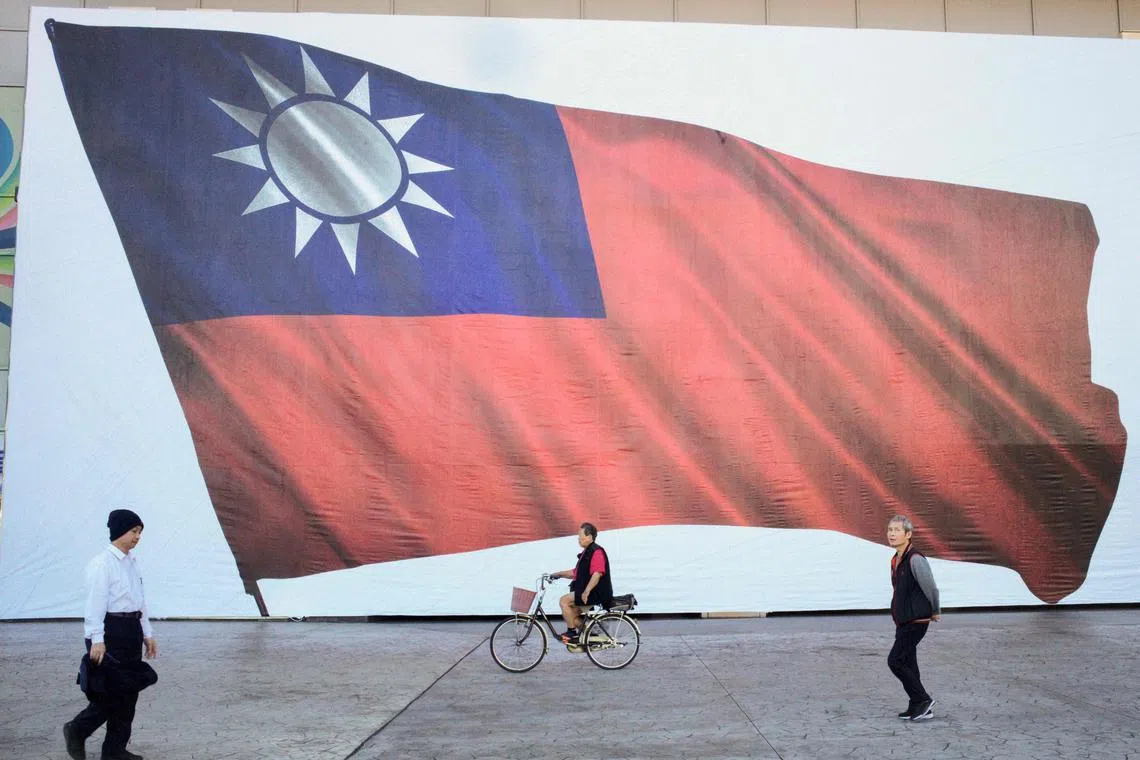Taiwan detects 36 Chinese military aircraft in high single-day activity
Sign up now: Get insights on Asia's fast-moving developments

Taiwan said it had detected 36 Chinese military aircraft and six naval ships operating in its vicinity, and that 13 of the aircraft “crossed the median line of the Taiwan Strait”.
PHOTO: AFP
Follow topic:
TAIPEI - Taiwan’s defence ministry announced on March 22 the highest single-day number of Chinese military aircraft around the island in 2024, which analysts attributed as a reaction to Taiwan’s political outreach to Europe in recent days.
China regards the self-governing Taiwan as its territory to be reunified. Taiwan rejects China’s sovereignty claims.
The March 22 incursion, an uptick from the previous day’s tally, follows a pattern of what experts dub “grey zone” actions – tactics that fall short of outright acts of war – which have ramped up since the 2016 election of President Tsai Ing-wen.
Political tensions have also risen since January after Ms Tsai’s deputy Lai Ching-te – who Beijing regards as a “dangerous separatist” – was elected as president, and amid an ongoing row between China and Taiwan over a fatal boat incident.
In the 24 hours leading up to 6am on March 22, the Ministry of National Defence said it had detected 36 Chinese military aircraft and six naval ships operating around Taiwan.
The ministry added that among the 36 military aircraft detected, 13 “crossed the median line of the Taiwan Strait”, the sensitive waterway separating China from Taiwan.
The announcement comes on the heels of nighttime activity by the Chinese military, with Taiwan’s defence ministry announcing at around 10.30pm on March 21 that 20 fighter jets, aerial unmanned vehicles and transport planes had been detected from 7.30pm.
It is also the day after an uptick in activity during the 24-hour period ending at 6am on March 21, when the ministry said Beijing had sent in 32 aircraft.
Ahead of January’s election of Mr Lai, Beijing warned he would bring “war and decline” to the island.
Mr Lai will take office on May 20 alongside Vice-President-elect Hsiao Bi-khim of the ruling Democratic Progressive Party (DPP).
Ms Hsiao – formerly Taiwan’s de facto ambassador to the United States – has been travelling in recent days, including to the Czech Republic and the European Parliament.
“Our fight for freedom and democracy is more shared than ever, and the Taiwanese people can rest assured it will always find dear friends in Europeans,” wrote French politician Dominique Riquet, who is also a member of the European Parliament, on social media platform X on March 21.
China has slammed Ms Hsiao’s visit to the Czech Republic
Analyst Wen-ti Sung said Beijing’s jump in military activity may be a “show of force to drive home its displeasure against Taiwan’s growing international engagement”.
“If this can discourage other international leaders from meeting Hsiao in the future, all the better, from Beijing’s perspective,” he told AFP.
Military expert Su Tzu-yun agreed that Ms Hsiao’s European travels could play a motivating factor, but pointed to Asia for added reasons, including a recent Manila meeting between US Secretary of State Antony Blinken and Philippine President Ferdinand Marcos Jr.
China and the Philippines are both claimants in maritime hot spot the South China Sea, where Beijing’s ships have been accused of causing collisions with Philippine boats
Mr Blinken earlier this week said the United States stands by its “ironclad” commitments to defend long-time ally the Philippines, drawing a rebuke from Beijing
“China’s behaviours are not only directed at Taiwan, but Taiwan will be the one that bears the most pressure,” Mr Su, a military expert at Taiwan’s Institute for National Defence and Security Research, told AFP.
Fishing boat row
Adding to tensions, a row between Taipei and Beijing over a fatal fishing boat incident
A Chinese speedboat carrying four people capsized on Feb 14 near Taiwan’s Kinmen islands while being pursued by the Taiwanese coast guard, killing two people. The other two survived.
Beijing has accused the Taiwanese authorities of “seeking to evade their responsibilities and hide the truth” about the incident, while a Taiwanese coast guard official has said the boat involved was zigzagging and “lost its balance” before capsizing.
China has said it will step up patrols around Kinmen following a series of deadly incidents, including the sinking of another boat in the area in March that resulted in the death of two crew members. AFP

